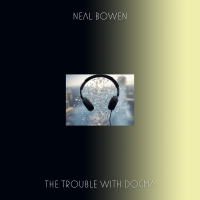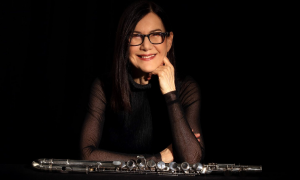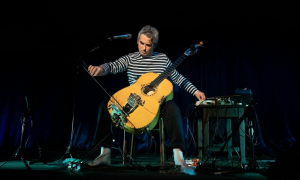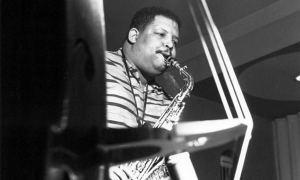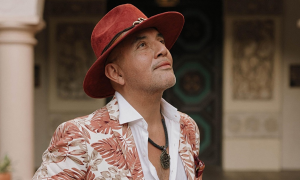Home » Jazz Articles » Interview » Dave Redmond: The Next In Line
Dave Redmond: The Next In Line

Courtesy Louis Scully
Double basses are interesting. They go through a lot of owners. They outlive us all, you know.
—Dave Redmond

Louis Stewart
guitarb.1944

Tommy Halferty
guitar
Kevin Brady
drumsb.1974

Meilana Gillard
saxophone, tenorb.1981
High-profile engagements with
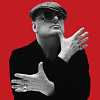
Ian Shaw
vocalsb.1962

Van Morrison
vocalsb.1945

Guy Barker
arrangerb.1957

George Colligan
multi-instrumentalistb.1969

Larry Coryell
guitar1943 - 2017
Redmond is less frequently seen as a leader, but Roots (Fresh Sound, New Talent), was an impressive debut that underlined his credentials as a mature composer. The follow-up has been a while in the making, a dozen years to be precise. All In Motion (Step By Records, 2025) once more showcases Redmond's compositional skills, his ten originals interpreted with verve and lyricism by the top-notch line-up of saxophonist

Stéphane Mercier
saxophone, altob.1970

Darren Beckett
drumsOf course, Redmond's own playing is a delight, toggling between hard-driving swing and deft ballad tempi, his great, earthy sound at the very heart of the music.
All About Jazz: You have been around the Irish jazz scene since the turn of the millennium, but when did you first take up the bass?
Dave Redmond: I was in school. I was 16. We had a family friend who played bass. His name was Paul Ashford. He was in quite a well- known band called Stepaside, and in the Miami Show Band back in the day. He played with Jerry Lee Lewis, believe it or not. He went to Berklee where he actually studied with

Jaco Pastorius
bass, electric1951 - 1987
I had dabbled with other instruments—bodhran, violin—but nothing really stuck with me. Then I got my hands on a bass and it was like, okay, this is it. My mom offered to get me a lesson, one lesson with Paul to see if I had an aptitude for the bass. I remember getting the bus into town to an office on Westmoreland Street. He just went through a few simple blues bass lines with me and I picked it up pretty quickly. But a lot was hinging on that first lesson because he was kind of going to give my mom the thumbs up or the thumbs down as to whether I should stick with it, you know?
AAJ: We know how that turned out. What beginner's advice did he give you?
DR: I got a couple of lessons with him and he was just like, 'look, you just have to join a band. So, the typical thing of bass players—as soon as they get a bass they join a band. There was a local school in Churchtown, which is the next village over from me. And there was a bunch of guys in a band there. I joined the band and did that for a few years.
AAJ: It was hardly jazz at that stage, was it?
DR: It was a rock band. It was all original stuff, but they were into stuff like Led Zeppelin, Thin Lizzy and Radiohead—stuff like that. We would have covered their songs in rehearsal but never did those songs on gigs. I think we were pretty terrible, probably (laughs).
AAJ: Was this on electric bass?
DR: Electric. The first lessons were on electric. The double bass came much later, when I was around 21. I bought a double bass in January in my final year studying jazz in Newpark. Within a couple of months I was doing gigs around Dublin. I remember my first gig was in Bewley's Cafед Theatre, and then the next night I was in JJs—straight into it.
AAJ: Sink or swim. Maybe it's the best way to accelerate your learning.
DR: Yeah. There were only a few double bass players around at that, when I started. I don't know where they all were (laughs), but it feels like there are a lot more double bass players now.
AAJ: We will talk about the Irish scene a little more, but first I would like to ask you about your own bass-playing inspirations; was there a touchstone bassist who inspired you, or who you tried to emulate in some aspect of their approach in these early days?
DR: I got some of my first lessons then with a neighbor, Dave Mooney, who's a great bassist on the scene—he gigs a lot now—and he would have introduced me to Jaco Pastorius. That would have been huge. Even my mom knew who Jaco Pastorius was, you know?
AAJ: That's probably not typical of your average mom.
DR: Yeah, well, she knew her music. I suppose Jaco would have been the first kind of lightbulb moment for me with the electric bass—you know,

Weather Report
band / ensemble / orchestra
Joni Mitchell
vocalsb.1943
AAJ: Thank you for sharing that. It is always revealing to hear about musicians' practice habits. Jaco Pastorius' playing on Mitchell's Hejira (Asylum, 1976) is just sublime—a key part of the magic of that album.
DR: It is, yeah. He really stands out on that album, doesn't he? And there's one track—I think he overdubs some fretless bass, almost like, legato stuff, you know? Joni really gave him a lot of freedom as well, which was really cool.
AAJ: We are here primarily to talk about Dave Redmond and specifically about your debut album as leader on Step By Records, All In Motion. Where does the title come from? Is there a backstory?
DR:: I just wanted to represent all of these different musicians that I've been playing with over the years. Working with a lot of people has brought me to this point, and I suppose the movements or the motion in my career has brought me together with these three international players.
AAJ: Let's begin with saxophonist Stедphane Mercier—a beautiful saxophonist. How did you come to be playing with him?
DR: I met Stедphane through Darren. I was very lucky that Stедphane used me on a gig in Ronnie Scott's with the great harmonica player

Gregoire Maret
harmonicab.1975

Jason Rebello
pianob.1969
AAJ: Had you known Antrim man Darren Beckett from way back?
DR: No, but the funny thing is, maybe 15 years before I played with Darren, I heard him on a George Colligan record. I remember the moment I first heard Darren play. It was a

Freddie Hubbard
trumpet1938 - 2008
AAJ: Yeah,

Lee Konitz
saxophone, alto1927 - 2020

Kenny Wheeler
flugelhorn1930 - 2014
DR: The first time I played with Darren was in Belfast actually, in No Alibi's bookshop. He was doing a trio with Ollie Howe, the great pianist from Brighton. He called me to fill in. Musically, we hit it off straight away. So that was the start with Darren.
AAJ: And George Colligan? Another superlative musician...
DR: George Colligan was always one of my favorite jazz piano players—ever, really. You know, the guy is

Jack DeJohnette
drumsb.1942

Buster Williams
bass, acousticb.1942

Don Byron
clarinetb.1958

Ralph Peterson
drums1962 - 2021

Drew Gress
bassb.1959

Lonnie Plaxico
bassb.1960

Jeff Ballard
drumsb.1963

Paul Bollenback
guitarb.1959
To be honest, I never thought I would ever get a chance to play with George, but it was just because of the connection with Darren. Just off the cuff one time, Darren said, "George has been in contact, and he's up for coming to Ireland and playing a few gigs." I didn't believe it, but we did a trio tour with George. I remember we did a week tour that time, that would have been in 2019, and we recorded an album
AAJ: George Colligan did another Irish tour with you guys in 2024. I was fortunate to catch the gig at Magy's Farm—there was tremendous energy about the quartet that evening.
DR: Playing with those guys is just brilliant. You're hanging on for dear life (laughs).
AAJ: You took the opportunity of that tour to go into the studio with that line-up. How long had your compositions been fermenting?
DR: I had a few compositions that I had written over Covid. We did one rehearsal in Linley and Maggie's place (

Linley Hamilton
trumpetb.1965
AAJ: You released All In Motion on Step By Records. What can you tell us about this label?
DR: It's a Belgian label run by Stедphane and his wife Emilie Boumal. It's a relatively new label, but they've been a great help with getting the album out there. I'm really happy to be represented by the label—it's really cool.
AAJ: You, Darren Beckett and Stедphane Mercier also released a trio album, Centro (Step By Records, 2024). It is an excellent album, though perhaps more measured, more introspective than All In Motion, which has more fire;. Was it a case of not wanting to make the same record again, or was it the influence of George Colligan that changed the direction of the music?
DR: That's a good question. Yeah, I think with this album the influence of George was absolutely huge. I just love the way he plays on up- tempo swing, and I suppose I wanted to make a contemporary swing album with George as kind of the move. The album with Darren and Stедphane, Centro— the instrumentation would have lent itself to being a bit more introspective and atmospheric. Maybe subconsciously I was thinking about how the trio would sound with George involved, because we've played as a trio with George and we've played as a trio with Stедphane, so I suppose subconsciously I just had an idea of the direction I wanted this album to go in.
AAJ: For Centro, the writing was shared between you and Stедphane. With All In Motion, this is all your music. How would you describe the emotions of composing by yourself for other musicians? I imagine it's liberating but daunting, frustrating and exhilarating, all somehow mixed up.
DR: For a little while I made a point of trying to write some music every single day, especially during Covid, even if it was just a few bars. It was almost like a way of me keeping sane or during the pandemic. It was like a little routine. So, I had a lot of bits and pieces written, and it was just a case of trying to prepare it for that band.
It was daunting, especially bringing my compositions to Stедphane and Darren, even though they're always very supportive. I was definitely nervous about bringing compositions to George he's an absolutely great composer. He's one of the great composers in jazz today. I'm really inspired by his writing and I'm always paying attention to his compositions. They're just great to play over and they're always great melodies, Harmonically they're amazing. He writes such great stuff. He came up with some amazing suggestions on how to make the music work, and he really put himself into it. Even when we were in the studio he was going, "oh, let's try this, let's try that," and "I think we can play that one better." He was really supportive and creative in the studio. He's a great guy to have, you know. It really was a great experience.
AAJ: The results are superb—you can feel the chemistry in the quartet. You get a big old earthy sound out of your instrument;. Is this something that you have always had from the beginning or is it just something you've had to nurture and develop as you've grown as a player?
DR: To be honest, I feel like I'm still working on my sound on the double bass. It's a fine balance between a lot of different elements, you know, the string height and how hard you play and all that kind of stuff. I'm constantly working on it.
I remember I got a lesson with the great bassist Drew Gress once, and I noticed he was playing not his regular bass, but a borrowed bass and he was still sounding like Drew Gress. I was like, "How are you getting such a great sound out of the instrument?" He was saying he imagines the sound that comes out of the instrument before he plays the note, so it's like he's almost projecting the idea of the sound, of how he wants that note to sound before he even plays it. So there's a bit of that involved.
But it's a fine balance, because if you want to play with a lot of virtuosity you have to sacrifice a bit of your sound quality coming from your bass. I've always been working on it—still am.
AAJ: What sort of bass are you playing on All In Motion? It has such a wonderful sound.
DR: At the moment I am playing a 100-year-old French bass. It was made in Paris in a factory called Thibouville-Lamy. I think they produced a lot of instruments, like maybe 60,000 instruments, including violins, violas, cellos and a few double basses. I bought the bass in London. I remember

Kevin Brady
drumsb.1974
But I am actually getting a bass made at the moment, which is going to be a copy of an old Amati bass. So, I've been waiting a couple of years for that. That one's in the pipeline. I'm excited about that as well. Hopefully, I'll have that for the tour, actually.
AAJ: Do you know any of the history of your French bass, who played it before you?
DR: The guy in the shop who sold me the bass told me that it was with one owner for 50 years—a woman who played in an orchestra for half a century. That's all I know.
AAJ: It's a pity you couldn't find out about her story, isn't it?
DR: I'd love to know, yeah. Double basses are interesting. They go through a lot of owners. They outlive us all, you know.
AAJ: You are touring again with this quartet to promote the album, aren't you?
DR: We've got a gig in Parakeet Jazz Club in London, in Kentish Town. And then we have a gig in Digbeth Jazz Club in Birmingham. The rest of the concerts are around Ireland—eight gigs in all, just to launch the album and get the guys over. I am a little bit nervous, but I'm also really looking forward to it.
AAJ: The nerves are probably a very healthy sign—it means you care. If you weren't showing any nerves, that might not be normal. I'm sure once you get up on stage and get going, it just takes off, doesn't it?
DR: Well, yeah. I suppose I'm a bassist, so I'm happy to be somewhere at the back, doing my thing. Being a leader as a bassist is quite rare. It's not as common as maybe a saxophonist or a pianist being the leader. It's a little bit out of my comfort zone, but I think that's a good thing as well. It's important to do these things.
AAJ: Dave, you studied at Newpark at the start of the millennium, and you're currently teaching bass at Dublin City University—around 20 years between studying bass and teaching bass. Has jazz education changed much in Dublin in that time?
DR: Yeah, I think it has. When I studied at Newpark it would have been a three-year associate diploma, and the second year out of the three would have been part-time. Now it's like a fully-fledged four-year degree. It's a lot more involved now, which is great. I think I was lucky with my particular class. I had a lot of great musicians who are still players on the scene to this day. I was lucky to be in a strong year.
AAJ: What about the student body? Has that changed much in character over a couple of decades, the profile of students?
DR: There's more students now, and there's a lot more international students as well that go to DCU. I think there's a very high standard now as well, and that is reflected in the scene. It seems to be, jazz seems to be getting popular with young people again as well in Dublin, which is a great thing to see. There's a lot of gigs where you're getting a younger audience as well. And just the volume of gigs—there's a lot more gigs happening. Students are putting on a lot more gigs. There's jam sessions happening all around Dublin now.
I feel like the scene is healthier now than when I started. There was probably not the same amount of gigs in Dublin that there is now. There was a lull for a few years in the middle there, where things went really quiet, but I think it's building back up now, and the scene is getting really strong, which is amazing to see.
AAJ: What are your hopes going forward for this quartet that you're leading with George and Stephane and Darren?
DR: I would hope to build on this tour, you know, and possibly try and get some more gigs, some international gigs, and maybe even another recording if possible. But I wouldn't take it for granted, you know, working with these guys. I feel very lucky that to even be playing with them at all.
AAJ: That's very humble of you. I am sure they feel fortunate to be playing with you too.
DR: Thanks a million, Ian.
Tags
AAJ: Yeah, {{m: Lee Konitz Kenny Wheeler Ollie Howe Jack DeJohnette Buster Williams Lonnie Plaxico Jeff Ballard Paul Bollenbeck the gig at Magy's Farm linley hamilton Drew Gress
Comments
PREVIOUS / NEXT
Support All About Jazz
 All About Jazz has been a pillar of jazz since 1995, championing it as an art form and, more importantly, supporting the musicians who make it. Our enduring commitment has made "AAJ" one of the most culturally important websites of its kind, read by hundreds of thousands of fans, musicians and industry figures every month.
All About Jazz has been a pillar of jazz since 1995, championing it as an art form and, more importantly, supporting the musicians who make it. Our enduring commitment has made "AAJ" one of the most culturally important websites of its kind, read by hundreds of thousands of fans, musicians and industry figures every month.
Go Ad Free!
To maintain our platform while developing new means to foster jazz discovery and connectivity, we need your help. You can become a sustaining member for as little as $20 and in return, we'll immediately hide those pesky ads plus provide access to future articles for a full year. This winning combination vastly improves your AAJ experience and allow us to vigorously build on the pioneering work we first started in 1995. So enjoy an ad-free AAJ experience and help us remain a positive beacon for jazz by making a donation today.

Dublin
Concert Guide | Venue Guide | Local Businesses
| More...
Playlist
Premium
Weekly newsletter
Get more of a good thing
Our weekly newsletter highlights our top stories and includes your local jazz events calendar.








